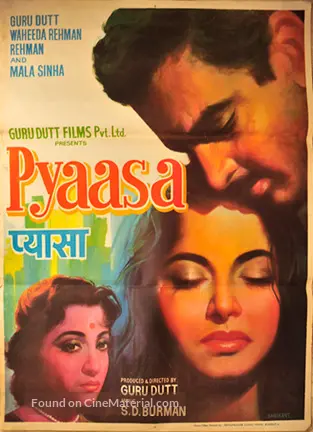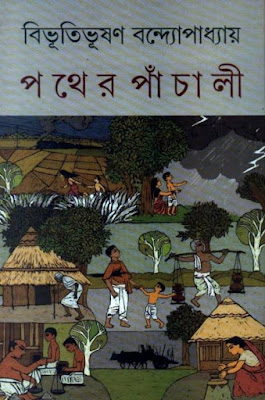A Film Review: Pyaasa (1957): A Guru Dutt Gem
"The final third of this is convoluted but also moving, as dramatic compositions heighten the narrative conflict between artistic idealism and an avaricious society." - a critic after Venice Film Festival screening on 2015.A masterpiece in its own right, Pyaasa, renders a strong message which is unarguably way ahead of its time considering the scenario of the industry and society. Guru Dutt presents the audience a classic conflict between idealism and reality. Producer-Director and Lead, Vasanth Kumar Shivashankar Padukone, successfully tells us a story about a struggling rhymester who is penniless but strict to his own set of ideals. He holds firm belief on humanity and pessimistic view towards life whilst having an optimistic perception on love, devotion and, emotion. Though the characters seem a little extravagant, it doesn't overindulges the cinematic experience.
 |
| The poster of Pyaasa (1957) [Source: CineMaterial.com] |
(Spoilers ahead)
.......
.......
This is a story about Vijay (Guru Dutt), others are the links to the story. Sattar (Johnny Walker), a masseuse on street and Gulabo (Waheeda Rehman), a prostitute are among the first admirers of him. Vijay's college love Meena serves the purpose of portraying a practical woman who is also the passion for his poetry. Yet she left him for wealth to marry a reputed publisher. Hence, Vijay states,
"Love, for her, is a hobby that she can barter for material pleasures"He pens rhymes for a street masseuse who uses that to chant. Gulabo uses his verses to attract customers. His poems find appreciations from unusual places yet he fails to attract the entire world. His brothers reject him while his mother dies waiting for him to be succeeded. These all hardships force him to commit suicide on rail tracks. On the way, he finds a destitute beggar shivering in cold. He gives his coat and rushes to approaching train. His motto leads here.
"Giving happiness to others is the real happiness in the world rather than seeking it for your own"The beggar gives away his life to spare Vijay's wearing his coat. The world takes Vijay to be dead and appreciates his poems as those are his last pieces. He achieves his coveted fame and recognition through his death. Although he was not dead, people started to make profit from his pseudo-death. Even they refused to identify him as it will hurt their earnings and reputation. This disgusts the poet. He refuses to comply with this society, this culture, the world. He sings at his own memorial:
This world of palaces, thrones and crowns, This society which is enemy to the humanity, This customs of wealth-hungry world, Even if I get this, what of it to me?
He rejects the notion of this selfishness and cruelty of the world. Even when Meera comes to sooth him in order to clinch his rightful fame and wealth for VIjay, he can not take on the double standard of the people. He says with a sorrowful heart and eyes full of tears that,
"....I have no complaints against my brothers, nothing against any people. But I have strong bones to pick against the way of that society which snatches humanity form its humans, makes brothers unanimous, turns friends into enemies for selfish reasons. I have complaints against the customs and the culture of this world which revere the lifeless things whilst trample down the living men. Where shedding tears for poor's sorrow is a crime and greeting each other with respect is considered as cowardice. I can not attain peace by living here..."This sums up the whole message of this movie where in the end, the poet, Vijay leaves for unknown with Gulabo in a far away land where they will not need to go further. The escapist wins the heart through a truly eye-opener.
This movie is considered cult classic and will definitely remain so for its unavoidable pitch and deep teachings for the society.
PYAASA on IMDb


Comments
Post a Comment